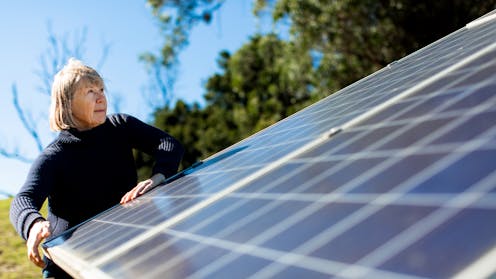Bribe or community benefit? Sweeteners smoothing the way for renewables projects need to be done right
- Written by The Conversation

When a renewable energy developer announces a new project, there’s one big question mark – how will nearby communities react?
Community pushback has scuttled many renewables projects. Sometimes, communities are angry landowners hosting infrastructure will be paid, but neighbours and those further afield may not.
As a result, renewable projects often involve schemes where the developer gives funding or resources to local community initiatives.
Australia has dozens of these schemes, with many more to come as the clean energy transition accelerates. The Clean Energy Council estimates developers contribute about A$1,050 to communities for every megawatt of wind and about $850 for solar.
The problem is, research shows poorly designed schemes can look a lot like bribery. Developers dish out money to gain community acceptance. Our new research points to a clear solution: design these schemes carefully.
How do these schemes work?
Renewable developers usually structure community-benefit schemes in one of three ways:
community funds, where a developer offers a one-time or ongoing payment for local infrastructure such as roads, services or community projects
in-kind benefits, such as investment in local sports fields or tourism initiatives
local ownership models, such as offering community members preferential access to shares in the company or a community co-ownership model of the project.
In Australia, a number of community schemes are already established or planned.
More are on their way. The Queensland government has introduced laws which require wind and solar farm developers enter into community benefit agreements.
Worldwide, offshore wind farms have for many years involved community benefit sharing. Australia is very likely to follow suit as this industry emerges.
Developers will sometimes set up more targeted neighbour payment schemes where funding is given to nearby landowners.
What are they for?
There are three reasons why benefit sharing can be a good idea overall. They are:
1. Impact on locals: solar farms take up large areas of land, while wind farms on land or sea draw the eye and can compete with other uses of the space. Community benefit schemes can help counterbalance these impacts.
2. Benefits are centralised: solar, wind and battery developments generate significant economic value. But this is largely captured by the developer. Benefit schemes can make residents feel the deal is fairer.
3. Acceptance: change of any kind is often hard. Offering incentives to towns and communities can make the change easier.
Straying into bribery?
The definition of a bribe is a benefit which influences or intends to influence a person to violate their role-based obligations. Offering money to a police officer to avoid losing your licence would count as a bribe.
Community benefit sharing isn’t a bribe in a strict legal sense. But the payments can resemble bribes if they influence community members to accept the new development. Improving community acceptance is often a central goal of such schemes.
The accusation is common. In the United Kingdom, researchers observe these schemes are regularly seen:
as an attempt by local developers to ‘bribe’ local communities to ‘buy’ support for their wind farm development.
Community members may decry a scheme as a “paltry bribe” or “shut up candy”. Some insist their “principles are not for sale”.
Developers recognise this too. As one says:
you don’t just turn up in a community and say, don’t worry, we’ll buy you a new rugby pitch […] because it really does look like you’re trying to buy them off.
But do local communities have obligations which accepting a renewables project might violate?
As part of a democracy, residents have civic obligations to make public-spirited decisions, evaluating policies and developments based not on self-interest but in a principled way.
This is why it’s illegal to pay someone to vote for a particular candidate in an election, for instance.
Offering money for community initiatives isn’t intrinsically wrong. As a community objector to a wind farm proposal put it:
Of course it is a relevant planning consideration if a wind power company is offering to pour significant sums of money into a community for the life of a wind farm […] Why should that not be recognised as a good thing?
But any economic boon to a town must be considered alongside other important concerns, rather than wiping them away.
If these schemes operate by influencing citizens to ignore their civic duties, that’s intrinsically wrong. Worse still, it risks a backlash from offended community members.
In the worst cases, benefit sharing operates as a pay-off, where uneasy communities are given money to reduce their resistance.
Achieving fairness, avoiding bribery
The solutions are straightfoward: design these schemes strategically so they are fair and avoid eroding civic obligations. Here are four aims:
1. Minimise self-interest. Schemes should avoid large up-front payments and focus on in-kind benefits.
2. Respect the community. Employ and contract local staff, keep the community informed and respond transparently to complaints.
3. Encourage community involvement. Big renewable projects should stack up on energy, environmental, economic and community grounds. Robust and genuine community consultation should be used when designing any benefit scheme.
4. Ensure integrity. Development and implementation of any scheme should be genuine, transparent and accountable.
Getting it right
As climate change intensifies, Australia’s clean energy transition has a clear moral urgency. But this cannot be done by steamrolling local residents or buying them off with cash for community projects.
When community benefit schemes are sensibly designed with local input, it will boost both climate action and civic legitimacy.







